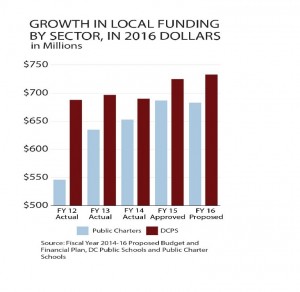DC’s school budget has both good and bad news for students and parents. The bad news: Unlike last year, when DC schools saw a substantial funding increase, the mayor’s proposed fiscal year 2016 budget won’t give schools a boost. The school funding formula will remain flat and, after adjusting for inflation, this is a cut in local funding. One of the apparent impacts of this is a cutback in afterschool programs.
The good news: Funding to support low-income children at risk of academic failure will now be allocated based on each school’s number of at-risk students, giving high-poverty schools more resources to meet their student’s needs.
The mayor proposes no changes to the main local funding source for DC Public Schools (DCPS) and Public Charter Schools: the Uniform Per Student Funding Formula. Schools will see a modest amount of extra local funding only to meet the needs of the 2,000 additional students expected to enroll next year. The mayor’s budget also makes no changes to funding for Public Charter Schools’ facilities.
High-Poverty Schools Will Get Their Fair Share of “At-Risk” Funds
Last year, DCPS received substantial new resources to assist low-income students, but did not distribute this “at risk” funding based on the size of each school’s low-income population. Many high-poverty schools lost out. However, this will change in 2015-16, when these funds will flow to DCPS schools proportionally. Schools in Wards 1, 4, 7, and 8 will see more at-risk funding next year as a result of better distribution.
Afterschool Programs Were Cut
DCFPI has significant concerns regarding the allocation of afterschool funding in the proposed FY 2016 DCPS budget. While the budget expands the “extended school day” program to more schools — which adds an hour of instructional time to the school day — at least 20 schools will lose afterschool funds. Plus, afterschool staff in the DCPS central office will be cut by over 20 positions; these are staff that often help schools line up quality afterschool programming.
DCPS should ensure that no school loses its capacity to serve students after school just because it is extending the traditional school day at more schools. While both programs can keep children safe and engaged outside of traditional school hours, afterschool or “expanded learning” programs are different from extended school day; they involve community organizations and provide enrichment such as music, sports, or exposure to careers that schools often do not provide even in an extended school day. Afterschool programs also support working parents by offering services as late as 6:00 p.m.
The Council will hold the second part of its DCPS budget oversight hearing (government witnesses only) today at 10 a.m., and OSSE’s oversight hearing on Thursday at 10 a.m.

